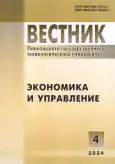Coproduction of Merit Goods as a Way to Reduce Information Asymmetry
- Authors: Manukyants S.V.1
-
Affiliations:
- Volga State University of Technology
- Issue: No 4 (2024)
- Pages: 6-14
- Section: ECONOMIC THEORY
- URL: https://journal-vniispk.ru/2306-2800/article/view/292056
- DOI: https://doi.org/10.25686/2306-2800.2024.4.6
- EDN: https://elibrary.ru/ZLJQBO
- ID: 292056
Cite item
Full Text
Abstract
Introduction. Free medical services are characterized by the presence of information asymmetry, as well as a positive effect of consumer participation in production. This makes it relevant to study the impact of coproduction on information asymmetry.
The research objective of this work is to explore the possibilities of coproduction to reduce information asymmetry in the process of providing citizens with medical services as merit goods.
The research methods include the analysis of relevant domestic and foreign scientific publications, the Russian legislative framework, synthesis, analytic and graphic modeling.
Results. In the sphere of production of medical services as merit goods, the condition of complementarity of the public sector contribution and citizens’ individual efforts is realized, which suggests the presence of coproduction here. The impact of coproduction on reducing information asymmetry in the medical services market occurs through two main channels. Firstly, the growing contribution of citizens increases their awareness of their own health status and the factors influencing it. Secondly, the less formal attitude of health care providers to the informed consent of patients transforms it from a formal document removing risks from the service provider into a tool that increases patients’ awareness and level of trust in medical professionals. This enhances the contribution of citizens to the production of respective merit goods and also reduces the negative effect of the low level of interpersonal trust inherent in modern Russia.
Conclusion. The study of the essence of coproduction allows us to reveal the mechanism of reducing information asymmetry through increasing the contribution of citizens to production. In the case of free medical services, this means an increase in health capital, improvement of the healthcare system economic efficiency, and a rise in the level of interpersonal trust.
Keywords
Full Text
About the authors
Suren V. Manukyants
Volga State University of Technology
Author for correspondence.
Email: ManukyancSV@volgatech.net
SPIN-code: 5034-5003
Senior Lecturer at the Chair of Economic Theory
Russian Federation, 3, Lenin Sq., Yoshkar-Ola, 424000References
- Barile S., Saviano M., Polese F. Information asymmetry and co-creation in health care ser-vices. Australasian Marketing Journal (AMJ). 2014;22(3): 205–217. doi: 10.1016/j.ausmj.2014.08.008
- Ostrom V., Ostrom E. Public goods and public choices. In: Alternatives for Delivering Public Services: Toward Improved Performance. Savas E. S. (Ed.). Boulder, USA, Westview Press; 1977. Pp. 7–49.
- Larionova N. I., Manukyants S. V. Free medical services in Russia as a merit good. Vestnik of Volga State University of Technology. Ser.: Economics and Management. 2024;(1):6–17. DOI: https://doi.org/10.25686/2306-2800.2024.1.6; EDN: XWMAGN (In Russ.).
- Norman R. Service Management: Strategy and Leadership in Service Business. 2nd ed. Chiches-ter, John Wiley & Sons; 1991. 202 p.
- Osborne S., Radnor Z., Nasi G. A New Theory for Public Service Management? Toward a (Public) Service-Dominant Approach. American Review of Public Administration. 2012;43(2):135–158. doi: 10.1177/0275074012466935
- Alford J. Why Do Public-Sector Clients Coproduce? Toward a Contingency Theory. Administration & Society. 2002;34(1):32–56. doi: 10.1177/0095399702034001004
- Ostrom E. Crossing the great divide: coproduction, synergy, and development. World Development. 1996;24(6):1073-1087. doi: 10.1016/0305-750X(96)00023-X
- Mineev A. N. Researches of the market of paid medical services and image of the medical organization. Upravlenie Ekonomicheskimi Sistemami: Elektronnyi Nauchnyi Zhurnal. 2017;(6(100)):45. EDN: YTSOGX (In Russ.).
- Rubinstein A. Ya. The theory of patronized goods and the paternalism in economic theories: general and special. Moscow, IE RAS Publ.; 2015. 52 p. EDN: TWLTUN (In Russ.).
Supplementary files











